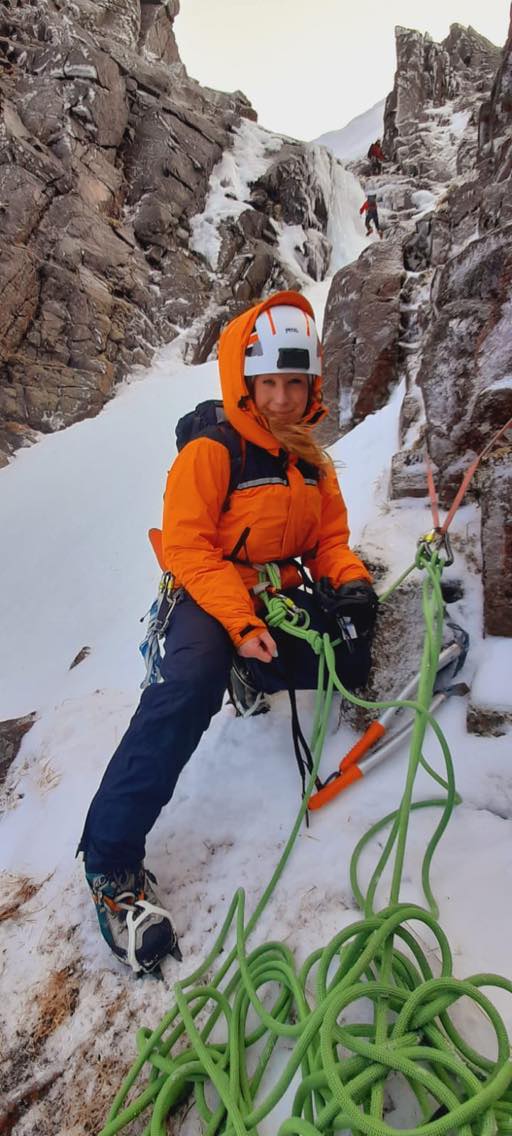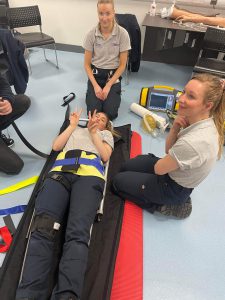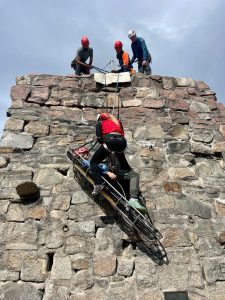Balancing Paramedicine and Mountain Rescue – Emma Atkinson

Balancing Paramedicine and Mountain Rescue – Emma Atkinson
Mountain Rescue Volunteers are available at a moment’s notice for a call-out. But how do our volunteers balance life and work with saving lives? In the second of a series of interviews we chat to Emma Atkinson about volunteering for Aberdeen Mountain Rescue Team whilst also training to be a paramedic and working as a freelance outdoor instructor.
We asked Emma a few questions about her time in the team and how she balances her commitments.

Q&A
When and how did you join a team?
My Mountain Rescue journey began as a child, my mum was a member of Cairngorm MRT (she recently retired after about 30 years of service) and so I grew up involved with activities at the base and stories of call-outs. It was something I felt drawn to and began my own journey as an operational volunteer with Cairngorm MRT in 2019 subsequently joining Aberdeen Mountain Rescue Team when I moved.
What are the best things about being in a Mountain Rescue Team?
It combines a lot of things I enjoy – mountaineering, paramedicine, working in a team. Being able to use the skills I have gained to assist those in difficulty is rewarding and motivates me to keep learning and developing as an MR member. It also gives you roots in a community and is a great way to meet likeminded folk.
What are the hardest things?
It can be challenging balancing team commitments with personal life, outdoor work and paramedic training. Call-outs don’t always have the desired outcome either and that can pose psychological challenges for the team.
Tell us more about your work and study?
I am in my final year of paramedic training with Robert Gordon University. I also work freelance as an outdoor instructor.
Paramedicine a full time degree where I spend half my time on placement with ambulance crews and gaining practical experience in other care settings such as theatres or community care. The other half is split between learning practical skills in simulation and attending theory lectures.
I think the most important skill as a student is being a good learner! There is a lot of information to take on and I am under no illusion that will stop once I qualify! Paramedic skills are very similar to that of MR – being able to perform under pressure, communicate well and make decisions.
The outdoor work requires maintenance of physical mountaineering skills but also the ability to teach and constantly risk assess to keep folk safe in challenging conditions or consequential terrain.
Do you find that balancing studying with volunteering presents any challenges? What are these and how do you manage them?
We train every week in Aberdeen MRT, this can be difficult with essay deadlines and exams. I plan ahead and schedule in my diary and this helps manage my time. If a call-out comes in I can usually sneak away from lectures and catch up later (not sure I should be publicly admitting that!) but when I’m on shift I am unavailable for the team, so I try to make up for these periods by having more input in delivery of training sessions.
Do you find that there are positive benefits to your studies and career of volunteering for Mountain Rescue? What are these?
Definitely! There is a lot of skill and knowledge overlap between paramedicine and MR. My experiences within MR help me grow as a paramedic and vice versa. MR has taught me a lot about balancing casualty care with the need to extract from awkward or unsafe locations and this has come in handy a few times on the ambulance. Delivering medical training encourages me to do extra reading on topics like hypothermia and trauma so that helps my studies too. We use lots of non-technical skills in MR too and these all help within paramedicine.
Do you find that there are also skills from your studies that you can bring to volunteering for MR? What are these?
Yes – From a medical perspective my experiences on the ambulance are directly applicable to MR. I am gaining lots of experience in assessing and managing casualties, and learning to deal with illness, injury and death.
How do your university support your volunteering for MR?
The university are keen on students having extra-curricular activities and my lecturers are always encouraging us to seek experiences out with the ambulance that help us develop as paramedics. A lot of our theory lectures are online or involve self-directed work and this helps with being able to fit everything in.

I’d definitely recommend that students interested in MR approach their local teams if they would like to be involved. There are more ways to help out than just as an operational volunteer, for example a few folk on my course have been involved with being mock casualties for our training sessions, this is beneficial for both parties being a good learning opportunity for students and making our training scenarios more realistic.